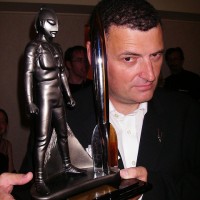Hugo Award
Established in 1953, The Hugo Awards are awarded to the best science fiction or fantasy works and achievements of the previous year. Nominees and winners are voted for by members of the World Science Fiction Society, and the awards themselves are presented at the annual World Science Fiction Convention over a number of various categories.
Dramatic Presentation
Both Doctor Who and Torchwood have received nominations in the category of "Best Dramatic Presentation, Short Form", which is awarded to "a dramatised production in any medium, including film, television, radio, live theatre, computer games or music", generally lasting less than 90 minutes. [1] Doctor Who has received multiple nominations for each of the eight years since its revival, with a total of six wins.
Steven Moffat has also been described as something of a "juggernaut". To date, he has personally written eleven nominated stories, four of which which have won the award. Although only five nominees are selected each year, Moffat received two nominations in 2011, as well as a further three in 2013.
In 2006, Dalek and Father's Day were nominated; The Empty Child/The Doctor Dances won.
In 2007, School Reunion and Army of Ghosts/Doomsday were nominated; The Girl in the Fireplace won.
In 2008, Human Nature/The Family of Blood and Captain Jack Harkness were nominated; Blink won.
In 2009, Silence in the Library/Forest of the Dead and Turn Left were nominated. [2]
In 2010, The Next Doctor and Planet of the Dead were nominated; The Waters of Mars won.
In 2011, Vincent and the Doctor, and A Christmas Carol were nominated; The Pandorica Opens/The Big Bang won.
In 2012, The Girl Who Waited and A Good Man Goes To War were nominated; The Doctor's Wife won.
In 2013, Asylum of the Daleks, The Angels Take Manhattan and The Snowmen were nominated. [3]
Related Work
Doctor Who has also featured in the "Best Related Work" category since its revival, which is awarded to "work related to the field of science fiction, fantasy, or fandom ... works eligible include, but are not limited to, collections of art, works of literary criticism, books about the making of a film or TV series, biographies and so on". [4]
Chicks Dig Time Lords: A Celebration of Doctor Who by the Women Who Love It was the winner of the 2011 award, and Chicks Unravel Time: Women Journey Through Every Season of Doctor Who was also nominated in 2013.
Neil Gaiman
Prior to the award winning episode The Doctor's Wife, Neil Gaiman's writing also achieved four other Hugo Awards, as well as a further nomination. These were awarded over four separate categories; "Best Short Story", "Best Novel", "Best Novella", and "Best Related Work".
The 2008 award for "Best Dramatic Presentation, Long Form" was also won by the film Stardust, which was adapted from his novel of the same name.
Footnotes
- ↑ Hugo Award Categories. The Hugo Awards. Retrieved on 3 September 2012.
- ↑ The award was won by Joss Whedon's Dr Horrible's Sing-Along Blog.
- ↑ The award was won by the Game Of Thrones episode Blackwater.
- ↑ Hugo Award Categories. The Hugo Awards. Retrieved on 2 September 2013.

